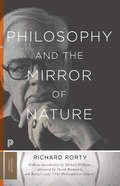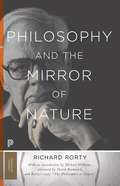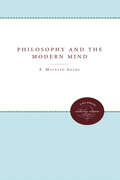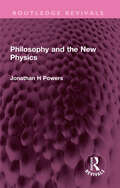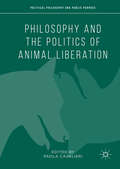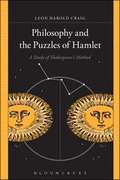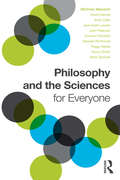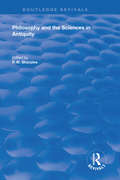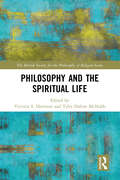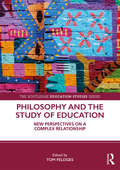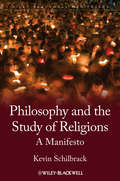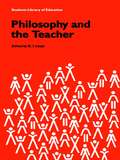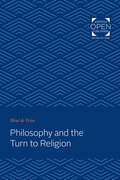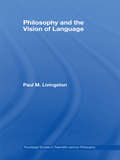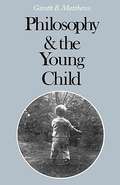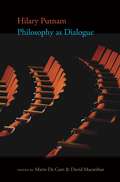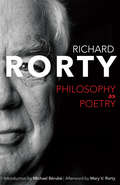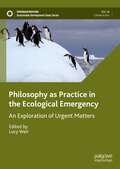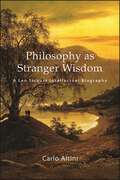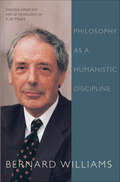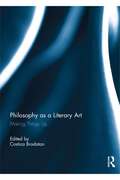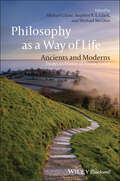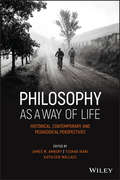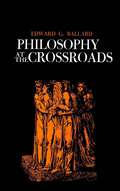- Table View
- List View
Philosophy and the Mirror of Nature
by Michael Williams David Bromwich Richard RortyWhen it first appeared in 1979, Philosophy and the Mirror of Nature hit the philosophical world like a bombshell. In it, Richard Rorty argued that, beginning in the seventeenth century, philosophers developed an unhealthy obsession with the notion of representation: comparing the mind to a mirror that reflects reality. Rorty's book is a powerful critique of this imagery and the tradition of thought that it spawned. Today, the book remains a must-read and stands as a classic of twentieth-century philosophy. Its influence on the academy, both within philosophy and across a wide array of disciplines, continues unabated. This edition includes new essays by philosopher Michael Williams and literary scholar David Bromwich, as well as Rorty's previously unpublished essay "The Philosopher as Expert."
Philosophy and the Mirror of Nature
by Richard RortyWhen it first appeared in 1979, Philosophy and the Mirror of Nature hit the philosophical world like a bombshell. In it, Richard Rorty argued that, beginning in the seventeenth century, philosophers developed an unhealthy obsession with the notion of representation: comparing the mind to a mirror that reflects reality. Rorty's book is a powerful critique of this imagery and the tradition of thought that it spawned. Thirty years later, the book remains a must-read and stands as a classic of twentieth-century philosophy. Its influence on the academy, both within philosophy and across a wide array of disciplines, continues unabated. This edition includes new essays by philosopher Michael Williams and literary scholar David Bromwich, as well as Rorty's previously unpublished essay "The Philosopher as Expert. "
Philosophy and the Modern Mind
by E. Maynard AdamsIn this unique philosophical critique of modern Western civilization, Adams argues that contemporary culture is deranged by false assumptions about the human mind. He sees a growing gap between the subjectivistic culture and the structure of reality which has not only produced Originally published 1975.A UNC Press Enduring Edition -- UNC Press Enduring Editions use the latest in digital technology to make available again books from our distinguished backlist that were previously out of print. These editions are published unaltered from the original, and are presented in affordable paperback formats, bringing readers both historical and cultural value.
Philosophy and the New Physics (Routledge Revivals)
by Jonathan H PowersFirst Published in 1982 Philosophy and the New Physics is a compact and yet remarkably rich excursion through the history of physics from Newtonian mechanics to quantum physics. The theory of relativity, quantum mechanics and ideas about the ‘fundamental constituents’ of matter have attracted a great deal of philosophical comment. Indeed, the originators of some of these theories thought they were solving philosophical problems as well as scientific ones. Classical physics is often portrayed as epitomizing ‘mechanistic materialism’, and the revolution in modern physics is variously claimed to vindicate ‘logical positivism’, ‘operationalism’, ‘organicism’, ‘dialectical materialism’ and ‘Buddhist metaphysics’. In this book Jonathan Powers criticizes all of these claims and argues that such varied and conflicting interpretations are possible because of ineradicable elements of conventionality in scientific theories. This is a must read for scholars and researchers of philosophy of science and philosophy in general.
Philosophy and the Politics of Animal Liberation
by Paola CavalieriThis edited collection testifies to the fact that the animal liberation movement is now entering its political phase, after a period dominated by ethical approaches that undermined the paradigm of human supremacy and demanded justice for nonhuman beings. The contributors of this book collectively confront and take on questions of social transformation, guided by the idea that philosophy has an important role to play even at such a new level. They start from such diverse perspectives as critical theory, left liberalism, and biopolitical thought. The result is an articulated picture in which, beyond any principled divergence, it is possible to detect the emergence of a relevant set of shared political preoccupations. This exploration of those offers fresh theoretical insights and suggestions for praxis.
Philosophy and the Precautionary Principle
by Daniel SteelScholars in philosophy, law, economics and other fields have widely debated how science, environmental precaution, and economic interests should be balanced in urgent contemporary problems, such as climate change. One controversial focus of these discussions is the precautionary principle, according to which scientific uncertainty should not be a reason for delay in the face of serious threats to the environment or health. While the precautionary principle has been very influential, no generally accepted definition of it exists and critics charge that it is incoherent or hopelessly vague. This book presents and defends an interpretation of the precautionary principle from the perspective of philosophy of science, looking particularly at how it connects to decisions, scientific procedures, and evidence. Through careful analysis of numerous case studies, it shows how this interpretation leads to important insights on scientific uncertainty, intergenerational justice, and the relationship between values and policy-relevant science.
Philosophy and the Puzzles of Hamlet: A Study of Shakespeare's Method
by Leon Harold CraigShakespeare's famous play, Hamlet, has been the subject of more scholarly analysis and criticism than any other work of literature in human history. For all of its generally acknowledged virtues, however, it has also been treated as problematic in a raft of ways. In Philosophy and the Puzzles of Hamlet, Leon Craig explains that the most oft-cited problems and criticisms are actually solvable puzzles. Through a close reading of the philosophical problems presented in Hamlet, Craig attempts to provide solutions to these puzzles. The posing of puzzles, some more conspicuous, others less so, is fundamental to Shakespeare's philosophical method and purpose. That is, he has crafted his plays, and Hamlet in particular, so as to stimulate philosophical activity in the "judicious" (as distinct from the "unskillful") readers. By virtue of showing what so many critics treat as faults or flaws are actually intended to be interpretive challenges, Craig aims to raise appreciation for the overall coherence of Hamlet: that there is more logical rigor to its plot and psychological plausibility to its characterizations than is generally granted, even by its professed admirers. Philosophy and the Puzzles of Hamlet endeavors to make clear why Hamlet, as a work of reason, is far better than is generally recognized, and proves its author to be, not simply the premier poet and playwright he is already universally acknowledged to be, but a philosopher in his own right.
Philosophy and the Sciences for Everyone
by Michela MassimiWhat is the origin of our universe? What are dark matter and dark energy? What is our role in the universe as human beings capable of knowledge? What makes us intelligent cognitive agents seemingly endowed with consciousness? Scientific research across both the physical and cognitive sciences raises fascinating philosophical questions. Philosophy and the Sciences For Everyone introduces these questions and more. It begins by asking what good is philosophy for the sciences before examining the following questions: The origin of our universe Dark matter and dark energy Anthropic reasoning in philosophy and cosmology Evolutionary theory and the human mind What is consciousness? Intelligent machines and the human brain Embodied Cognition. Each chapter includes an introduction, summary and study questions and there is a glossary of technical terms. Designed to be used on the corresponding Philosophy and the Sciences online course offered by the University of Edinburgh this book is also a superb introduction to central topics in philosophy of science and popular science.
Philosophy and the Sciences in Antiquity (Routledge Revivals)
by R. W. SharplesOriginally published in 2005. There has been much discussion in scholarly literature of the applicability of the concept of 'science' as understood in contemporary English to ancient Greek thought, and of the influence of philosophy and the individual sciences on each other in antiquity. This book focuses on how the ancients themselves saw the issue of the relation between philosophy and the individual sciences. Contributions, from a distinguished international panel of scholars, cover the whole of antiquity from the beginnings of both philosophy and science to the later Roman Empire.
Philosophy and the Spiritual Life (The British Society for the Philosophy of Religion Series)
by Victoria S. Harrison Tyler Dalton McNabbThis book breaks new ground for the philosophy of religion by showcasing work that engages with the lived reality of the spiritual life. It demonstrates that philosophy’s relationship with spirituality is more than a historical curiosity and that, in the twenty-first century, it is still meaningful to think about philosophy in connection with spirituality. The chapters are organised around the following themes: spiritual practice and philosophical understanding; philosophical reflections on living a spiritual life; philosophical problems concerning the spiritual life. The first part discusses whether or not the topic of spirituality should be given a more fundamental role within the philosophy of religion, and, if so, how that might be accomplished. The second part addresses fundamental issues concerning human beings, their lives, and their self-understanding in relation to the spiritual life. The final part considers philosophical problems that emerge when discussing the spiritual life. By bringing together discussions of these topics, this volume constitutes a valuable resource for scholars in disciplines in which the spiritual life is a focus of interest, particularly philosophy, theology, and religious studies.
Philosophy and the Study of Education: New Perspectives on a Complex Relationship (The Routledge Education Studies Series)
by Tom FeldgesCombining contributions from international academics and practitioners, this new text develops students’ ability to philosophise as well as learn about philosophy and education. It considers issues concerned with the interface between education and wider society but goes beyond this to explore education and philosophy at a micro level: the teacher–learner relationship. It challenges and empowers students to use philosophy as a tool within education, as a set of theories to understand education and as a potential means to develop solutions to problems as they occur within practice. Assuming no pre-existing philosophical background, Philosophy and the Study of Education explores complex topics including: encouraging young people to criticise and challenge all authority; the limits of a religious-based education; the desire for ‘alternative facts’ or ‘truths’; the second-class status of vocational pursuits; the inherent struggle in the teacher–student relationship; the relationship between emotion, morality and autonomy in teaching. Including discussion questions and further recommended reading, this thought-providing book will support and inspire all those on Education Studies, Childhood Studies and Youth Studies courses in developing a critical perspective and understanding the true value of philosophy within education.
Philosophy and the Study of Religions: A Manifesto (Wiley-Blackwell Manifestos)
by Kevin SchilbrackPhilosophy and the Study of Religions: A Manifesto advocates a radical transformation of the discipline from its current, narrow focus on questions of God, to a fully global form of critical reflection on religions in all their variety and dimensions. Opens the discipline of philosophy of religion to the religious diversity that characterizes the world today Builds bridges between philosophy of religion and the other interpretative and explanatory approaches in the field of religious studies Provides a manifesto for a global approach to the subject that is a practice-centred rather than a belief-centred activity Gives attention to reflexive critical studies of 'religion' as socially constructed and historically located
Philosophy and the Teacher (Students Library Of Education Ser.)
by D. I. LloydFirst published in 1976. Routledge is an imprint of Taylor & Francis, an informa company.
Philosophy and the Turn to Religion
by Hent de VriesOriginally published in 1999. If religion once seemed to have played out its role in the intellectual and political history of Western secular modernity, it has now returned with a vengeance. In Philosophy and the Turn to Religion, Hent de Vries argues that a turn to religion discernible in recent philosophy anticipates and accompanies this development in the contemporary world. Though the book reaches back to Immanuel Kant, Martin Heidegger, and earlier, it takes its inspiration from the tradition of French phenomenology, notably Emmanuel Levinas, Jean-Luc Marion, and, especially, Jacques Derrida. Tracing how Derrida probes the discourse on religion, its metaphysical presuppositions, and its transformations, de Vries shows how this author consistently foregrounds the unexpected alliances between a radical interrogation of the history of Western philosophy and the religious inheritance from which that philosophy has increasingly sought to set itself apart.De Vries goes beyond formal analogies between the textual practices of deconstruction and so-called negative theology to address the necessity for a philosophical thinking that situates itself at once close to and at the farthest remove from traditional manifestations of the religious and the theological. This paradox is captured in the phrase adieu (à dieu), borrowed from Levinas, which signals at once a turn toward and a leave-taking from God—and which also gestures toward and departs from the other of this divine other, the possibility of radical evil. Only by confronting such uncanny and difficult figures, de Vries claims, can one begin to think and act upon the ethical and political imperatives of our day.
Philosophy and the Vision of Language (Routledge Studies in Twentieth-Century Philosophy #Vol. 31)
by Paul M. LivingstonPhilosophy and the Vision of Language explores the history and enduring significance of the twentieth-century turn to language as a specific object of investigation and resource for philosophical reflection. It traces the implications of the access to language in some of the most prominent projects and results of the historical and contemporary tradition of analytic philosophy, including the projects of Frege, Wittgenstein, Sellars, Quine, Brandom, and Cavell. Additionally, it demonstrates the deep and enduring connections between the analytic tradition’s inquiry into language and the parallel inquiries of phenomenology, critical theory, and deconstruction over the course of the twentieth century. Finally, it documents some of the enduring consequences of philosophy’s inquiry into language for contemporary questions of social and political life. The book provides a clear, accessible and widely inclusive introduction to the relevance of language for analytic and continental philosophy in the twentieth century and is readable by non-specialist audiences. It should contribute to a growing historical sense of the location of the analytic tradition in a broader geography of social, political and critical thought. Furthermore, it contributes to building bridges between this tradition and the neighboring continental ones from which it has all too often been estranged.
Philosophy and the Young Child
by Gareth B. MatthewsThis book presents striking evidence that young children naturally engage in a brand of thought that is genuinely philosophical. In a series of exquisite examples that could only have been gathered by a professional philosopher with an extraordinary respect for young minds, the author demonstrates that children have a capacity for puzzlement and mental play that leads them to tackle many of the classic problems of knowledge, value, and existence that have traditionally formed the core of philosophical thought. His anecdotes reveal children reasoning about these problems in a way that must be taken seriously by anyone who wants to understand how children think. The book provides a powerful antidote to the widespread tendency to underestimate children’s mental ability and patronize their natural curiosity. The author believes that adults have much to gain if they can learn to “do philosophy” with children, and his book is a rich source of useful suggestions for parents, teachers, students, and anyone else who might like to try.
Philosophy as Dialogue
by Hilary PutnamA collection of Hilary Putnam’s stimulating, incisive responses to such varied and eminent thinkers as Richard Rorty, Jürgen Habermas, Noam Chomsky, Martha Nussbaum, W. V. Quine, Wilfrid Sellars, John McDowell, and Cornel West.Hilary Putnam (1926–2016) was renowned—some would say infamous—for changing his philosophical positions over the course of his long and much-admired career. This collection of essays, the first of its kind, showcases how his ideas evolved as he wrestled with the work of his contemporaries.Divided into five thematic sections, Philosophy as Dialogue begins with questions of language and formal logic, tracing Putnam’s reactions to the arguments of Wilfrid Sellars, Noam Chomsky, Charles Travis, and Tyler Burge. Next, it brings together Putnam’s responses to realists and antirealists, philosophers of science and of perception, followed by forays into pragmatism and skepticism. While Putnam devoted most of his efforts to logic, mathematics, and the philosophy of mind, he also took up issues in moral philosophy, politics, and religion. Here we read him in conversation with giants of these fields, including Martha Nussbaum, Jürgen Habermas, Elizabeth Anscombe, Cora Diamond, Richard Rorty, and Franz Rosenzweig. Finally, Philosophy as Dialogue presents Putnam’s deeply personal and largely unknown writing on philosophical method that reveals the influence of W. V. Quine, Michael Dummett, and Stanley Cavell on his work.Once more, Mario De Caro and David Macarthur have presented and introduced a choice selection of Hilary Putnam’s writings that will change the way he is understood. Most of all, these thirty-six replies and responses to his contemporaries showcase the extraordinary—perhaps even unparalleled—breadth of his work, and his capacity to engage deeply with seemingly every mode of philosophy.
Philosophy as Poetry (Page-Barbour Lectures)
by Richard Rorty Michael Bérubé Mary Varney RortyUndeniably iconoclastic, and doggedly practical where others were abstract, the late Richard Rorty was described by some as a philosopher with no philosophy. Rorty was skeptical of systems claiming to have answers, seeing scientific and aesthetic schools as vocabularies rather than as indispensable paths to truth. But his work displays a profound awareness of philosophical tradition and an urgent concern for how we create a society. As Michael Bérubé writes in his introduction to this new volume, Rorty looked upon philosophy as "a creative enterprise of dreaming up new and more humane ways to live." Drawn from Rorty's acclaimed 2004 Page-Barbour lectures, Philosophy as Poetry distills many of the central ideas in his work. Rorty begins by addressing poetry and philosophy, which are often seen as contradictory pursuits. He offers a view of philosophy as a poem, beginning with the ancient Greeks and rewritten by succeeding generations of philosophers seeking to improve it. He goes on to examine analytic philosophy and the rejection by some philosophers, notably Wittgenstein, of the notion of philosophical problems that have solutions. The book concludes with an invigorating suspension of intellectual borders as Rorty focuses on the romantic tradition and relates it to philosophic thought.This book makes an ideal starting place for anyone looking for an introduction to Rorty's thought and his contribution to our sense of an American pragmatism, as well as an understanding of his influence and the controversy that attended his work.Page-Barbour Lectures
Philosophy as Practice in the Ecological Emergency: An Exploration of Urgent Matters (Sustainable Development Goals Series)
by Lucy WeirThis book argues that philosophy is as practical as plumbing and what we need right now is what philosophers can offer as philosophers to help us all, our species, and beyond, through this ecological emergency, this climate change, this anthropocene. This book is about the meaning and purpose of philosophy as a way of, a practice of, responding to the ecological emergency, which includes climate change, biodiversity loss, pollution, habitat destruction, and all the associated impacts that fragment, and threaten to create collapse, among the systems that created and sustain us. There are the related economic and social impacts, the fragmentation of communities and political ideologies through attitude polarisation, and the increasing threats to systems by those who seek to promote further exploitation at the expense of attempts to regain some system of cooperation and an attitude of compassion which is at the heart of our survival strategies as a species. Philosophy has always sought to address questions related both to our place in the universe, and to how to live, given our understanding of our place. Those of us committed to a philosophical life have used a range of metaphors and narratives to enlighten, and to exhort to action, those who would seek to understand what to do, how, and why. Philosophy has played a key role in helping us as a species to respond to the ecological emergency. What, then, is the practice of philosophy, given that we’re in an ecological emergency?This question is the thread, and it forms the framework for the dialogue that runs through the book.
Philosophy as Stranger Wisdom: A Leo Strauss Intellectual Biography (SUNY series in the Thought and Legacy of Leo Strauss)
by Carlo AltiniWhat is philosophy and who is the philosopher? What should be the relationship between the philosopher and the city? And what should be the attitude that the philosopher must have with respect to tradition, religion and politics? These questions, which have spanned the entire history of Western philosophical thought, from ancient Greece onwards, found original answers in one of the greatest figures of twentieth-century culture, Leo Strauss. Philosophy as Stranger Wisdom, thanks to a scrupulous study of his entire bibliography, represents the first truly comprehensive and complete intellectual biography of Strauss. The reader will find in these pages a Strauss who is not an American neoconservative theorist nor an orthodox Jew, but rather an original reader and interpreter of classical authors: from Thucydides and Plato to Machiavelli and Hobbes. Carlo Altini presents us with a philosopher who escapes any attempt at classification, who lived constantly in exile between theory and practice, philosophy and politics, immanence and transcendence, and who considered philosophy the most important critical exercise of human reason, always "out of date" and always "out of place."
Philosophy as a Humanistic Discipline
by Bernard WilliamsWhat can--and what can't--philosophy do? What are its ethical risks--and its possible rewards? How does it differ from science? In Philosophy as a Humanistic Discipline, Bernard Williams addresses these questions and presents a striking vision of philosophy as fundamentally different from science in its aims and methods even though there is still in philosophy "something that counts as getting it right." Written with his distinctive combination of rigor, imagination, depth, and humanism, the book amply demonstrates why Williams was one of the greatest philosophers of the twentieth century. Spanning his career from his first publication to one of his last lectures, the book's previously unpublished or uncollected essays address metaphysics, epistemology, and ethics, as well as the scope and limits of philosophy itself. The essays are unified by Williams's constant concern that philosophy maintain contact with the human problems that animate it in the first place. As the book's editor, A. W. Moore, writes in his introduction, the title essay is "a kind of manifesto for Williams's conception of his own life's work." It is where he most directly asks "what philosophy can and cannot contribute to the project of making sense of things"--answering that what philosophy can best help make sense of is "being human."Philosophy as a Humanistic Discipline is one of three posthumous books by Williams to be published by Princeton University Press. In the Beginning Was the Deed: Realism and Moralism in Political Argument was published in the fall of 2005. The Sense of the Past: Essays in the History of Philosophy is being published shortly after the present volume.
Philosophy as a Literary Art: Making Things Up
by Costica BradatanDespite philosophers’ growing interest in the relation between philosophy and literature in general, over the last few decades comparatively few studies have been published dealing more narrowly with the literary aspects of philosophical texts. The relationship between philosophy and literature is too often taken to be "literature as philosophy" and very rarely "philosophy as literature." It is the dissatisfaction with this one-sidedness that lies at the heart of the present volume. Philosophy has nothing to lose by engaging in a serious process of literary self-analysis. On the contrary, such an exercise would most likely make it stronger, more sophisticated, more playful and especially more self-reflexive. By not moving in this direction, philosophy places itself in the position of not following what has been deemed, since Socrates at least, the worthiest of all philosophical ideals: self-knowledge. This book was originally published as a special issue of The European Legacy.
Philosophy as a Way of Life
by Stephen R. Clark Michael Mcghee Michael ChaseThis unique collection of essays on the late Pierre Hadot's revolutionary approach to studying and practising philosophy traces the links between his work and that of thinkers from Wittgenstein to the French postmodernists. It shows how his secular spiritual exercises expand our horizons, enabling us to be in a fuller, more authentic way.Comprehensive treatment of a neglected theme: philosophy's practical relevance in our livesInterdisciplinary analysis reflects the wide influence of Hadot's thoughtExplores the links between Hadot's ideas and those of a wealth of ancient and modern thinkers, including the French postmodernistsOffers a practical 'third way' in philosophy beyond the dichotomy of Continental and analytical traditions
Philosophy as a Way of Life: Historical, Contemporary, and Pedagogical Perspectives (Metaphilosophy)
by James M. AmburyIn the ancient world, philosophy was understood to be a practical guide for living, or even itself a way of life. This volume of essays brings historical views about philosophy as a way of life, coupled with their modern equivalents, more prevalently into the domain of the contemporary scholarly world. Illustrates how the articulation of philosophy as a way of life and its pedagogical implementation advances the love of wisdom Questions how we might convey the love of wisdom as not only a body of dogmatic principles and axiomatic truths but also a lived exercise that can be practiced Offers a collection of essays on an emerging field of philosophical research Essential reading for academics, researchers and scholars of philosophy, moral philosophy, and pedagogy; also business and professional people who have an interest in expanding their horizons
Philosophy at the Crossroads
by Edward G. BallardA study of the course and consequences of modern Western thought, this volume deals with some of the most crucial philosophical questions of our time.In Philosophy at the Crossroads, Edward G. Ballard defines philosophy as the interpretation of archaic experience -- that transition or change which forces one to attempt to understand, and usually reformulate, the basic notional framework within which order and value are discovered. He illustrates the relevance of this definition in the work of six philosophers -- Plato, Descartes, Hume, Kant, Jusserl, and Heidegger -- and develops an interpretation of several important lines of growth in Western philosophy.The first transition Professor Ballard examines is the movement from pre-Homeric, oral, and poetic culture to the Socratic, written, intellectualist culture. The new tradition is evident in Plato, who is at once mythmaker and humanist and also the father of the sciences. Plato, says Ballard, instituted an uneasy balance between a sciencelike interest in the world and a humanist self-care by defining the former as a means to the humanistic end. He demonstrates that this uneasy balance is an important clue to understanding Western intellectual history.The author traces the growth and various directions of Western thought through Heidegger, discusses its contemporary status, and speculates on the potential for its future development.
